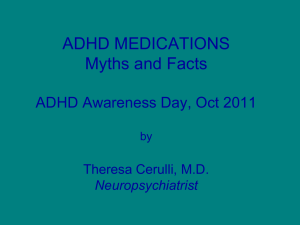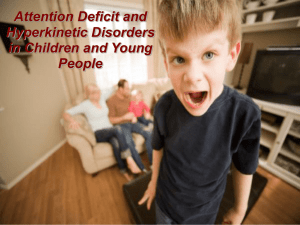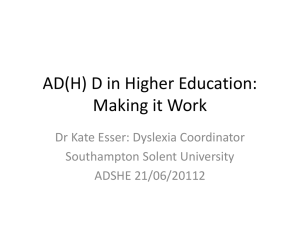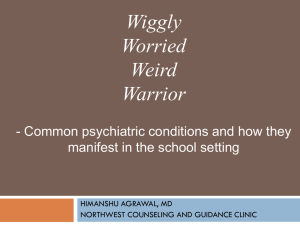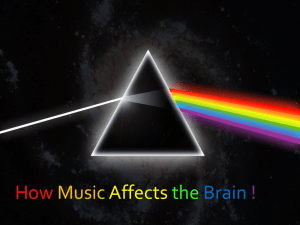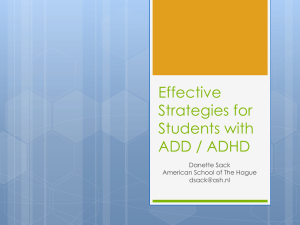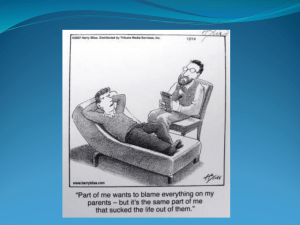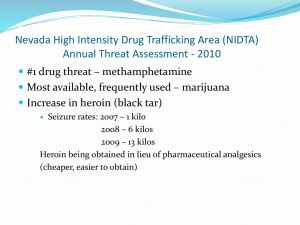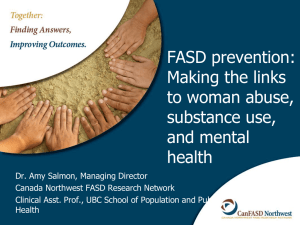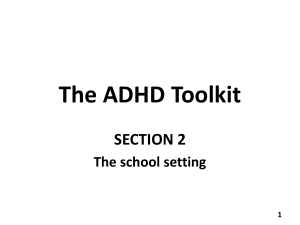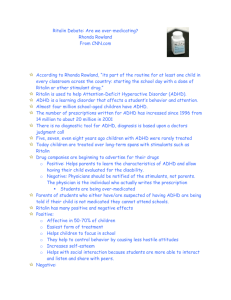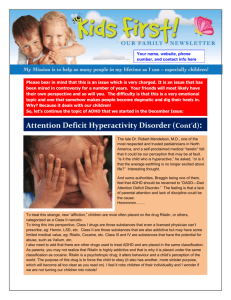Medications for Children and Adults with FAS
advertisement
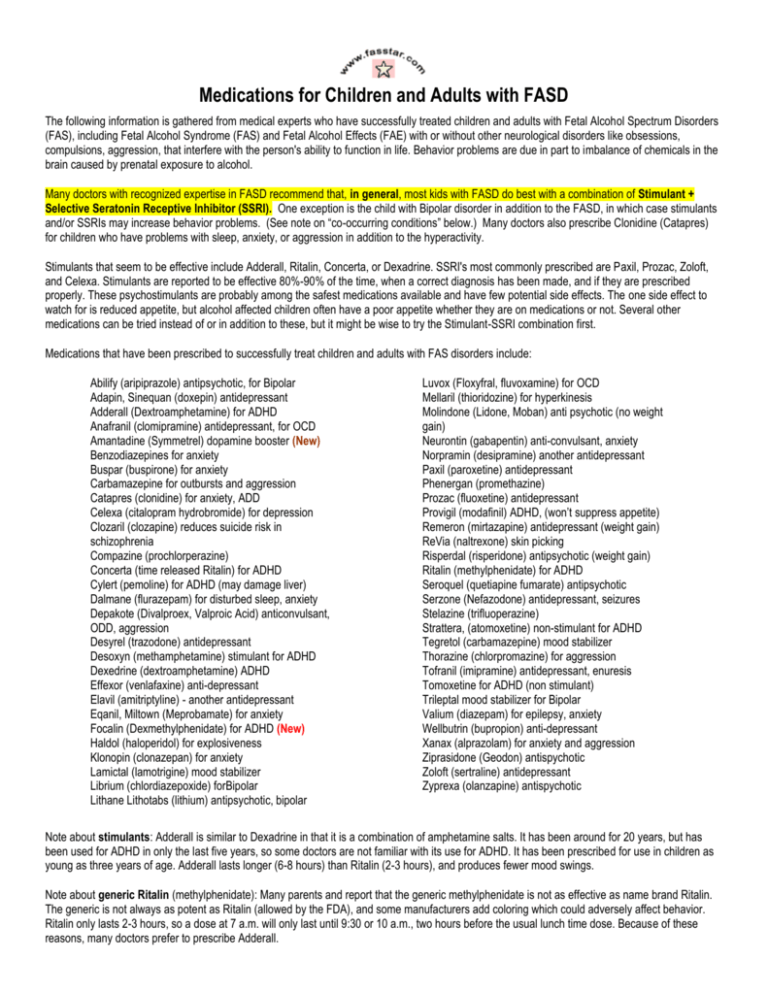
Medications for Children and Adults with FASD The following information is gathered from medical experts who have successfully treated children and adults with Fetal Alcohol Spectrum Disorders (FAS), including Fetal Alcohol Syndrome (FAS) and Fetal Alcohol Effects (FAE) with or without other neurological disorders like obsessions, compulsions, aggression, that interfere with the person's ability to function in life. Behavior problems are due in part to imbalance of chemicals in the brain caused by prenatal exposure to alcohol. Many doctors with recognized expertise in FASD recommend that, in general, most kids with FASD do best with a combination of Stimulant + Selective Seratonin Receptive Inhibitor (SSRI). One exception is the child with Bipolar disorder in addition to the FASD, in which case stimulants and/or SSRIs may increase behavior problems. (See note on “co-occurring conditions” below.) Many doctors also prescribe Clonidine (Catapres) for children who have problems with sleep, anxiety, or aggression in addition to the hyperactivity. Stimulants that seem to be effective include Adderall, Ritalin, Concerta, or Dexadrine. SSRI's most commonly prescribed are Paxil, Prozac, Zoloft, and Celexa. Stimulants are reported to be effective 80%-90% of the time, when a correct diagnosis has been made, and if they are prescribed properly. These psychostimulants are probably among the safest medications available and have few potential side effects. The one side effect to watch for is reduced appetite, but alcohol affected children often have a poor appetite whether they are on medications or not. Several other medications can be tried instead of or in addition to these, but it might be wise to try the Stimulant-SSRI combination first. Medications that have been prescribed to successfully treat children and adults with FAS disorders include: Abilify (aripiprazole) antipsychotic, for Bipolar Adapin, Sinequan (doxepin) antidepressant Adderall (Dextroamphetamine) for ADHD Anafranil (clomipramine) antidepressant, for OCD Amantadine (Symmetrel) dopamine booster (New) Benzodiazepines for anxiety Buspar (buspirone) for anxiety Carbamazepine for outbursts and aggression Catapres (clonidine) for anxiety, ADD Celexa (citalopram hydrobromide) for depression Clozaril (clozapine) reduces suicide risk in schizophrenia Compazine (prochlorperazine) Concerta (time released Ritalin) for ADHD Cylert (pemoline) for ADHD (may damage liver) Dalmane (flurazepam) for disturbed sleep, anxiety Depakote (Divalproex, Valproic Acid) anticonvulsant, ODD, aggression Desyrel (trazodone) antidepressant Desoxyn (methamphetamine) stimulant for ADHD Dexedrine (dextroamphetamine) ADHD Effexor (venlafaxine) anti-depressant Elavil (amitriptyline) - another antidepressant Eqanil, Miltown (Meprobamate) for anxiety Focalin (Dexmethylphenidate) for ADHD (New) Haldol (haloperidol) for explosiveness Klonopin (clonazepan) for anxiety Lamictal (lamotrigine) mood stabilizer Librium (chlordiazepoxide) forBipolar Lithane Lithotabs (lithium) antipsychotic, bipolar Luvox (Floxyfral, fluvoxamine) for OCD Mellaril (thioridozine) for hyperkinesis Molindone (Lidone, Moban) anti psychotic (no weight gain) Neurontin (gabapentin) anti-convulsant, anxiety Norpramin (desipramine) another antidepressant Paxil (paroxetine) antidepressant Phenergan (promethazine) Prozac (fluoxetine) antidepressant Provigil (modafinil) ADHD, (won’t suppress appetite) Remeron (mirtazapine) antidepressant (weight gain) ReVia (naltrexone) skin picking Risperdal (risperidone) antipsychotic (weight gain) Ritalin (methylphenidate) for ADHD Seroquel (quetiapine fumarate) antipsychotic Serzone (Nefazodone) antidepressant, seizures Stelazine (trifluoperazine) Strattera, (atomoxetine) non-stimulant for ADHD Tegretol (carbamazepine) mood stabilizer Thorazine (chlorpromazine) for aggression Tofranil (imipramine) antidepressant, enuresis Tomoxetine for ADHD (non stimulant) Trileptal mood stabilizer for Bipolar Valium (diazepam) for epilepsy, anxiety Wellbutrin (bupropion) anti-depressant Xanax (alprazolam) for anxiety and aggression Ziprasidone (Geodon) antispychotic Zoloft (sertraline) antidepressant Zyprexa (olanzapine) antispychotic Note about stimulants: Adderall is similar to Dexadrine in that it is a combination of amphetamine salts. It has been around for 20 years, but has been used for ADHD in only the last five years, so some doctors are not familiar with its use for ADHD. It has been prescribed for use in children as young as three years of age. Adderall lasts longer (6-8 hours) than Ritalin (2-3 hours), and produces fewer mood swings. Note about generic Ritalin (methylphenidate): Many parents and report that the generic methylphenidate is not as effective as name brand Ritalin. The generic is not always as potent as Ritalin (allowed by the FDA), and some manufacturers add coloring which could adversely affect behavior. Ritalin only lasts 2-3 hours, so a dose at 7 a.m. will only last until 9:30 or 10 a.m., two hours before the usual lunch time dose. Because of these reasons, many doctors prefer to prescribe Adderall. Note about anti-depressants: SSRI’s are commonly prescribed for depression, but they also effective in treating ADHD and behavior problems such as outbursts, aggression, and compulsive behaviors. The dose might even be higher than the usual dose for depression. Note about anti-psychotics: Risperdal or Seroquel may increase appetite, which could be beneficial for children with poor appetites. But if the appetite increases too much, then Moban or Lamictal might be a better choice. Note about co-occurring conditions: Most persons with FASD have some degree of attention deficit and attachment disorders. Sometimes individuals with FASD are diagnosed with other conditions, such as Asperger's Syndrome (mild Autism), depression, Tourette's syndrome, pervasive developmental disorder (PDD), Oppositional Defiant Disorder (ODD), Obsessive-Compulsive Disorder (OCD), Sensory Integration Disorder (SID), Reactive Attachment Disorder (RAD), Bipolar, or other psychiatric conditions. These could be misdiagnoses, or these conditions might occur along with FASD. When a set of symptoms are recognized, sometimes other core conditions are missed. Medications prescribed only for symptoms of ADHD, depression or compulsions (stimulants or SSRI's) could cause adverse reactions in the child who has FASD and a co-occurring condition such as Bipolar Disorder. Note about "natural" treatments: Over-the-counter treatments like St. John's Wort or herbs from health food stores might be helpful for some, but know that they are chemicals just like the prescription drugs, and could have ill effects when taken along with prescription drugs. Always check with your doctor when trying over-the-counter treatments. Note about diet: It is suggested that you avoid the following additives: MSG (monosodium glutamate), which is used in many restaurants and fast foods, and in some packaged processed foods; artificial food colorings (avoid Jell-O, Kool-Aid, fruit "drinks" like Hi-C, etc.); and Nutrisweet (aspartame), which can irritate the bladder and increases mood irritability. Although some parents have reported their children get "sugar highs" from excessive sugar intake, artificial additives are a bigger culprit than sugar. Some children are sensitive to certain foods. If your child does well on a certain meds regimen and then suddenly has a "bad day," ask yourself what he/she had to eat earlier or even the night before. Start reading labels to avoid additives and avoid restaurants for a few weeks to see if this helps. If you HAVE to go to McDonalds, do it when you can have your child safe at home later for the "melt-down" effect. Interestingly, caffeine drinks like Mountain Dew® could help, as the caffeine is a mild stimulant. Some parents have reduced or eliminated the need for meds through nutritional intervention. Note about dehydration: Neurologists who specialize in ADHD warn about adequate fluid intake. The child can become dehydrated long before asking for a drink of water. If the fluid intake is not adequate, the viscosity of the blood increases, which irritates the brain and can be reflected in irritable behavior. Note about Vitamins: Research studies now show a strong correlation between aggressive behavior in children and deficiencies in certain nutrients. Before changing your child's medications, try a daily multi-vitamin, one preferably without the artificial colorings. Note about aggressive behaviors: Dan Dubovsky tells us that some seizure disorders can increase what looks like aggressive behavior. If the seizure disorder is identified and treated, sometimes aggression can be minimized. Doctors should rule out seizure disorders before looking at other causes. Be aware that seizure activity does not always show up on EEGs, even with repeated tests. A WORD OF CAUTION: One child may respond favorably to a medication, and another child may have undesirable effects. Don't make a decision about medication based on somebody else's experience. There is no way of knowing how your child will respond to any specific medication. Some drugs should be avoided, unless closely supervised by a physician, because of their potentially harmful side effects. These include: Tricyclic Antidepressants (TCAs) such as Elavil, Tofranil, Desipramine, & Anafranil, because of cardiac toxicity, lower seizure threshold, and lethality in overdose; Diazepam (Valium) because of its long half-life; cognitive blunting and behavioral excitation may be a problem the next day; Chlorpromozine, because of lower seizure threshold, liver toxicity, excess sedation; Paroxetine (Paxil), because of increased interaction with other drugs (possible with all SSRI's). Pemoline (Cylert), because of liver toxicity; and Lithium, because of cardiac, renal and thyroid problems. A note about starting new meds: It is best to start/add/change only one medication at a time. Chart your child's behavior before, during, and after a meds change.One common mistake is trying too low a dose and stopping too soon before it has a chance to be effective. Start with a low dose and work up, until you either see positive results (and leave it there) or unwanted side effects (then try something else). Experts believe that if you can treat a child without having to prescribe meds, that is best. First you should try behavior management, psychotherapy and/or parenting classes. But if psychosocial treatments are not enough, don't be afraid to try different meds - in addition to good behavior management, or course. Once you find the combination that works best, your child will have more control over his/her behavior, a big step toward increased selfsufficiency and higher self-esteem. Disclaimer: This information should not be construed as medical opinion, consultation, or recommendations for course of treatment. The neurological problems of a child or adult with FASD are complex and require a complete psychiatric evaluation with a comprehensive face-to-face assessment by a trained specialist, such as a psychiatrist or a neurologist, even in the absence of a diagnosis of FASD. Families of persons who are already being followed by a specialist are encouraged to share this information with them. Families of persons who are only being followed by a primary care physician are encouraged to ask for a referral to a specialist, who can then formulate a treatment plan based on the individual assessment and on this information. Sources: Dr. Calvin Sumner (WV); Dan Dubovsky, researcher; Kieran O'Malley (1997) Iceberg Newsletter 7(4). Information compiled by FAS Community Resource Center, Tucson, Arizona www.fasstar.com/fas Updated January 8, 2009
